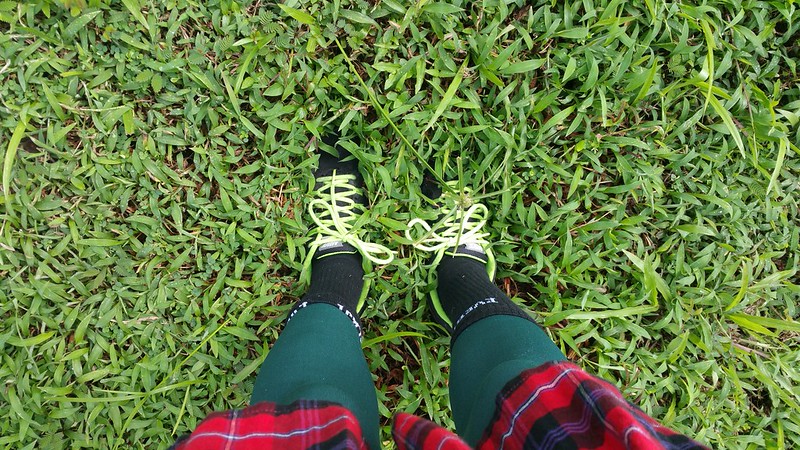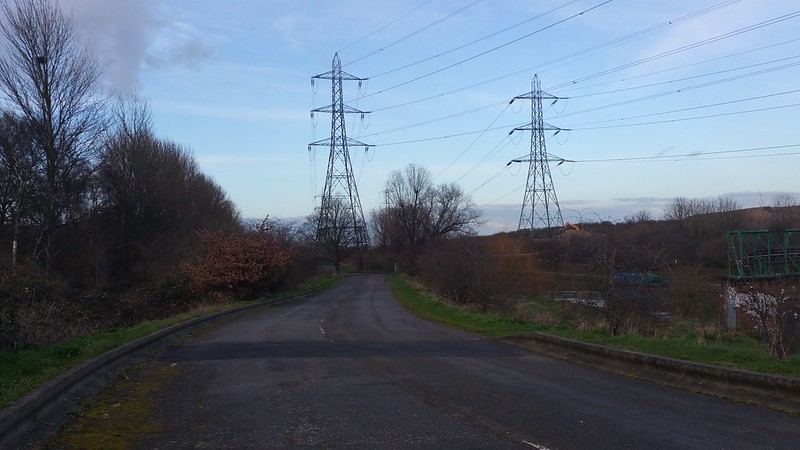
Mysterious Fevers
It is funny that once upon a time I complained that it was the cold that stopped me from walking in London. Now that I've managed to get over the cold of the UK, it is the heat and other environmental factors that are stopping me from walking in Singapore!
The first problem is the weather in Singapore. The unbearable heat! The sweat running into one's eyes! The tissues one must carry to stop one's glasses from fogging up during a walk. The sudden rain, or even passing thunderstorm that is sure to follow after a spell of intense hot weather. But the heat and unpredictable weather, to be honest, is but a trifling matter. The second and more pressing issue is... unexplained fever!
Upon my return to Singapore I had heartily jumped back into walking all over the place, poking around for snails and termites, observing waterfowl and early morning joggers, encircling all of Bedok Reservoir and merrily trotting all up and around Fort Canning. And then I was unexpectedly felled by a high fever that lasted for a ridiculous seven days...
The primary symptoms were debilitating joint and body pains and a high fever that kept returning even after panadol or ibuprofen. The body aches reminded me of the time I had contracted dengue around 2005 (wherein there was a dengue cluster at the block of the uni hall I was staying at), and I really didn't want to jump to conclusions just because I was misdiagnosed repeatedly the last time I had dengue - BUT THEN DATA.GOV.SG SAID WE LIVED IN BEDOK NORTH #1 DENGUE HOTSPOT OF SINGAPORE, and then all manner of wild conclusions were instantly jumped to.
"But I had only been in Singapore for 5 DAYS!" I whined, looking at my mildly bug-bitten legs. "How could I have contracted dengue so quickly??"
Fortunately as it turned out, after a trip to the A&E it was confirmed I did not have any of the three particular strains of dengue which are currently trending on this island. Which was great but still very mysterious. My final diagnosis was suspected 'tonsillitis', but I could not see any reason to begin a protracted 7-day course of antibiotics for an extremely mild (and basically non-existent) sore throat. As mysteriously as the high fever had come, it slipped away quietly a week later...
Well. And there went an entire week of my life. Without any reason or explanation...
The "Obscure Disease", Beri Beri
See: British India and the “Beriberi Problem”, 1798–1942
Whilst holed up in bed it seemed apt to begin reading up on the disease of beri-beri, the vitamin B1 (thiamine) deficiency which has retained its oddly exotic name through the ages. Every account of life in the early 1900s as well as WWII and the Battle of Singapore will invariably mention the problem of beri-beri, a disease which had great socio-economic and political impact, incapacitating and killing citizens, soldiers, workers, everyone alike in the rice-eating countries throughout Southeast Asia.
Most narratives of diseases in the early 20th century tend to read as a narrative of man's discovery and victory over disease - but arguably the story of beri-beri in these parts reads more as a story of a disease introduced by colonial technologies - unnecessarily prolonged by complex commercial interests and colonial shortsightedness. Somehow what annoys me is that to retain the exotic sounding name seems to suggest that the tropics or far east was the dangerous place or climate manufacturing the 'beri-beri', justifying the intervention of western medicine.
Its frustrating to read that the affliction of beri-beri was necessarily prolonged by complex commercial interests (rice exports!) and such shortsightedness, as seen through the continued misconceptions of beri-beri being a 'tropical disease' or 'place disease' and refusal to believe it was nutritional, exacerbated by logistical problems during the war years. What seems tragic is that by 1911 the cause of beri-beri is already established as a diet of overmilled white rice, yet helplessly little is done to dissuade or stop people from subsisting entirely on overmilled white rice and other foods which are deficient in vit B1 or worse, thiaminases that leech thiamine from one's diet...
Opisthotonic death pose / Star-gazing
Studies on beri-beri were often done on birds and I realised that pictures of the symptom of beri beri in animals were... rather alarming. As a human, you'll be glad to know that humans don't exhibit this symptom, but as for my pigeon and avian readers, the following pictures may be quite disturbing. In certain animals like birds especially, thiamine deficiency tends to produce a star gazing effect - a retraction of the head known as opisthotonus.

Source: David A Bender's page notes that in Peters RA's Biochemical lesions and lethal synthesis (Pergamon Press, Oxford, 1963), pigeons "show a characteristic head retraction when they are fed on a high carbohydrate diet with no thiamin, and restoration of the vitamin leads to rapid normalisation."
The internet also has no lack of stargazing chickens, pigeons, and other unfortunate poultry:
The opisthotonus caused by thiamine deficiency extends also to other livestocks. The following book on animal nutrition has a table listing the different symptoms of thiamine deficiency in different animals.
"Sheep with thiamin deficiency. characteristics of condition are head bent backwards (opisthotonos), cramp-like muscular contractions, disturbance of balance, and aggressiveness." Source: Vitamins in Animal Nutrition: Comparative Aspects to Human Nutrition By Lee Russell McDowell
Interestingly, you'll notice this 'star-gazing' pose is quite like the pose in which most dinosaurs are found. An article in NewScientist ("Watery secret of the dinosaur death pose") mentions studies in which a lot of quails and dead birds were dipped in cold water to see if they too would adopt the dramatic dinosaur death pose. Results were mixed but it was believed it was the water that did it...
Either way, a head pointed perpetually skywards would make movement and walking very difficult...
Casadastraphobia / fear of falling into the sky
...which brings me to a new bizarre symptom that has been mildly impeding my enjoyment of long distance walking, which also has something to do with looking up into the sky...
Ever since I can remember, I've always been unable to lie down on the ground outdoors and look up into the sky for the fear of falling into the sky. As irrational as it might sound, I always refused to do situps during PE class because the teacher would ask us to do it in the school field (such that we would be forced to face the sky!) and god forbid the gravity should turn off and we'd all fall into the sky! Even the school hall was no better. School camps in the school hall and having to sleep facing the high ceiling? Forget about it!

A new troubling symptom emerged as I was warming up for my Capital Ring walk. Whilst walking alone on a disused, empty path near the Angel Road Superstores, hearing the distant roar of the North Circular, I was genuinely enjoying a delightful walk in what felt almost like wilderness when I suddenly realised I was in a big open area with nothing else to hold on to! I blame the pylons for leading me to look upwards into the sky, alerting me to the desertedness of the spot, a true attack of the triffids horror moment!
Struck by sudden and urgent panic, I felt like taking off my shoes and even looked for any grass to hold on to but was forced to run back and take cover under a nearby bridge. Unfortunately, the rest of my walk home involved walking several miles along the River Lea towpath completely exposed without any cover, which felt quite traumatising at the time. Now, snug and safe in a house with a solid roof, we can sit back clutching the solid furniture laughing about it. But it is almost the definition of madness I tell you! Even a momentary glance skywards that lasts a moment too long is enough to provoke terror, although I know it's physically impossible to fall into the sky! AH!
Fortunately (or unfortunately), most of urban London and Singapore do not have open landscapes which trigger this irrational fear so I have rarely had to deal with it before...

No comments:
Post a Comment